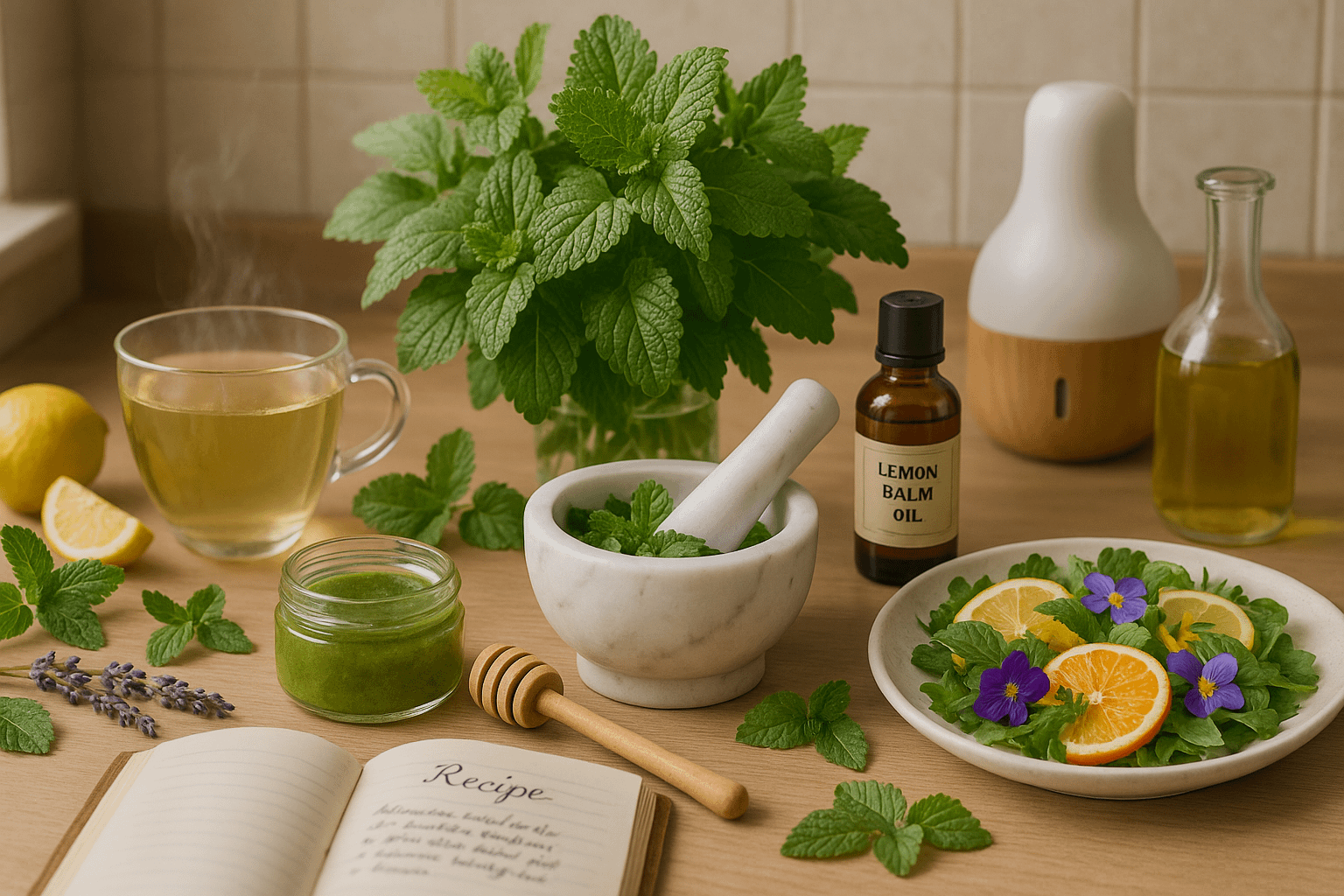Discover how lemon balm recipes can transform the way you approach flavor, wellness, and natural living—whether you’re seeking culinary inspiration, stress relief, or time-tested herbal remedies. This definitive guide explores what lemon balm is, why it has remained central to kitchen and apothecary traditions for centuries, and how to create, adapt, and master lemon balm recipes at home using the latest tools, platforms, and information.
Contents
- 1 Understanding Lemon Balm: The Herb Behind Extraordinary Recipes
- 2 Why Lemon Balm Matters: Historical Roots and Modern Benefits
- 3 Growing, Harvesting, and Sourcing Lemon Balm for Recipes
- 4 Mastering the Fundamentals: Lemon Balm Tea and Beyond
- 5 Culinary Applications: Lemon Balm in Savory and Sweet Creations
- 6 Wellness Beyond the Plate: Lemon Balm in Remedies and Self-Care
- 7 Troubleshooting and Perfecting Lemon Balm Recipes
- 8 Advanced Techniques and Modern Lemon Balm Innovations
- 9 Scientific Insights: Modern Research on Lemon Balm
- 10 Lemon Balm for Every Dietary Preference
- 11 Integrating Lemon Balm into Your Daily Rituals
- 12 Frequently Asked Questions About Lemon Balm Recipes
- 13 The Future of Lemon Balm Recipes: From Tradition to Innovation
- 14 Conclusion: Your Lemon Balm Journey
Understanding Lemon Balm: The Herb Behind Extraordinary Recipes
Lemon balm, known botanically as Melissa officinalis, is a perennial member of the mint family recognized for its delicate, citrus-mint scent and flavor. Grown in gardens worldwide, this Mediterranean native has enchanted cooks, healers, and gardeners for generations. Yet, many are just discovering how vibrant and versatile lemon balm recipes can be.
What makes it stand out among other kitchen herbs? Lemon balm’s gentle, uplifting aroma and flavor are surprisingly adaptable. The herb seamlessly enhances salads, teas, desserts, sauces, and even home remedies for stress and restlessness. It’s not just another culinary trend: lemon balm recipes are a bridge between centuries-old herbal wisdom and modern-day self-care needs.
Why Lemon Balm Matters: Historical Roots and Modern Benefits
To appreciate why lemon balm recipes are growing in popularity, it helps to understand both the herb’s legacy and its contemporary relevance. Traditionally, lemon balm has been cherished for calming nerves and soothing indigestion; it features prominently in Greek, Roman, and medieval European herbal traditions. Monastic gardens planted the herb for both culinary and apothecary uses, and it is noted in historical texts for its uplifting effects.
Today, these benefits are supported by scientific research. Studies confirm that lemon balm contains powerful compounds such as rosmarinic acid, offering antioxidant and mild antiviral activity. The most significant evidence points to lemon balm’s ability to relieve mild anxiety, support focus, and promote natural sleep—perfectly suited for today’s fast-paced lifestyles.
For anyone hoping to address daily stress, sleep concerns, or stagnant culinary routines, lemon balm recipes provide both practical nourishment and peaceful ritual.
Growing, Harvesting, and Sourcing Lemon Balm for Recipes
The cornerstone of any great lemon balm recipe is premium-quality leaves, preferably fresh from your garden or a reliable local source. Lemon balm is an accessible herb for most home gardeners: it thrives in partial sunlight and moist, well-drained soil. Regular trimming ensures a bushy, aromatic plant.
When harvesting, select tender young leaves for vibrant flavor. Harvesting is best in the morning, once dew has evaporated. Store fresh leaves in a paper-towel-lined container in the refrigerator; for long-term use, consider drying in a cool, dark place or freezing chopped leaves in small portions.
If you don’t have access to homegrown lemon balm, high-quality fresh or dried lemon balm is available through reputable herb suppliers and at local farmers markets. Gardening and plant identification apps such as PlantSnap can help you locate and identify lemon balm in your region.
Mastering the Fundamentals: Lemon Balm Tea and Beyond
All lemon balm recipes begin with the basics. Among the most popular is a simple, aromatic tea. This timeless beverage channels the herb’s gentle, soothing properties with minimal preparation—simply steep several fresh or dried leaves in hot water for ten minutes and enjoy.
Lemon balm tea is routinely recommended for easing tension, improving mood, and setting a relaxed tone for the day or evening. As interest in functional beverages grows, many home cooks experiment with infusing lemon balm in combination with chamomile, mint, or green tea for unique flavor profiles and additional wellness benefits.
Culinary Applications: Lemon Balm in Savory and Sweet Creations
The true power of modern lemon balm recipes lies in their versatility. Lemon balm’s citrusy notes lift both savory and sweet dishes with subtle complexity. In savory applications, try integrating lemon balm into pestos by blending it with basil, pine nuts, olive oil, and cheese for a bright, summery sauce that complements pasta, roasted vegetables, or grilled meat. Lemon balm also enhances vinaigrettes, lending depth to salads and steamed fish.
In the dessert realm, lemon balm shines in syrups, cookies, sorbets, and fruit salads. For example, lemon balm-infused simple syrup brings a delicate herbal dimension to lemonades, teas, cocktails, and fruit compotes. Finely chopped lemon balm in shortbread yields a sophisticated twist. Sorbets infused with lemon balm and fresh citrus can be a highlight of summer entertaining.
If you’re seeking inspiration, online recipe platforms such as Epicurious and Food52 offer hundreds of user-rated lemon balm recipes for all seasons and occasions. Apps like Yummly and Paprika Recipe Manager help you organize and scale your favorite finds to fit your preferences and pantry.
Wellness Beyond the Plate: Lemon Balm in Remedies and Self-Care
Lemon balm does more than flavor your food. One of its oldest and most enduring uses is as the backbone of simple, effective herbal remedies. Lemon balm tinctures, for instance, are prepared by steeping the leaves in high-proof alcohol for several weeks, then using a few drops in water for gentle mood support or to ease digestion. Lemon balm-infused oils, created by gently steeping leaves in olive oil, can be blended with beeswax to produce salves that soothe dry skin and minor irritations.
For those interested in self-study or tracking their herbal experiments, digital tools and communities make learning accessible. Platforms like HerbMentor by LearningHerbs offer expert tutorials in home remedy preparation, while MyHerbalApp functions as a digital journal for recording your own results and recipe adjustments.
Troubleshooting and Perfecting Lemon Balm Recipes

Occasionally, even experienced cooks encounter challenges when integrating an herb as nuanced as lemon balm. Sometimes, recipes may lack flavor if insufficient leaves are used, or bitterness may occur if older, woody stems are included. For best results, always use generous amounts of young, tender leaves and crush them just before use to release their aromatic oils. When using dried lemon balm, remember its flavor is more intense, so reduce the quantity accordingly.
For reliable year-round access, many find success drying lemon balm in small, loosely packed bunches or freezing it chopped in ice cube trays with water or oil. Proper storage away from heat and light is essential to preserve both potency and aroma.
Advanced Techniques and Modern Lemon Balm Innovations
Once you’ve mastered the basics, a world of advanced lemon balm recipes awaits. Try infusing mild vinegars with lemon balm to create herbal bases for salad dressings and marinades, or experiment with homemade kombucha flavored with fresh lemon balm during secondary fermentation.
Creative hosts are now freezing lemon balm leaves into ice cubes with edible flowers, adding visual and aromatic flair to beverages. In professional kitchens, lemon balm is increasingly used as a fresh palate cleanser between courses, or even incorporated into artisanal desserts and breads.
Online, community spaces such as Reddit’s r/herbalism and cooking-focused Facebook groups are invaluable for crowdsourcing troubleshooting tips, sharing photos, and swapping seasonal lemon balm recipes from around the world.
Scientific Insights: Modern Research on Lemon Balm
While lemon balm’s culinary appeal is reason enough to explore new recipes, the scientific community has also taken note. Rigorous clinical studies have correlated lemon balm extracts with reduced subjective anxiety and gently improved sleep quality, often without the side effects of pharmaceutical alternatives. There’s also emerging evidence pointing to mild cognitive benefits, such as improved focus and alertness, likely tied to the herb’s natural compounds.
It is generally safe for most people when used in culinary quantities, yet individuals who are pregnant, breastfeeding, or taking certain medications should consult a healthcare provider before experimenting with concentrated tinctures or extracts.
Lemon Balm for Every Dietary Preference
Another reason lemon balm recipes are gaining traction is their adaptability to diverse modern dietary needs. Since the herb contains essentially no carbohydrates or gluten, it is equally suitable for paleo, ketogenic, and vegan diets. Lemon balm can turn a basic salad into a nutrient-packed centerpiece, replace basil in vegan pesto, or introduce complexity to gluten-free pastries.
Cookpad and Allrecipes facilitate discovery and adaptation of allergen-sensitive or diet-specific recipes, making it easy to bring the benefits of lemon balm to any table.
Integrating Lemon Balm into Your Daily Rituals
Lemon balm recipes are most beneficial when incorporated effortlessly into your everyday routine. Start with a morning mug of lemon balm tea, brightened with a sprig of mint. At lunch, layer chopped lemon balm into salads or atop grilled vegetables. In the late afternoon, revive your senses with lemon balm-infused water. As bedtime approaches, enjoy a warm tisane or use a homemade lemon balm balm as part of your relaxation ritual.
When lemon balm becomes a daily habit—not an occasional experiment—you’ll experience its full potential for uplifting your mood, digestion, and culinary creativity.
Frequently Asked Questions About Lemon Balm Recipes
Lemon balm is highly versatile, but some common questions arise. Is it safe for children and elders? Yes, in standard culinary amounts. Can I substitute dried for fresh? Absolutely—just use one-third the amount by weight, as dried lemon balm is more concentrated. How do I keep my lemon balm tasty year-round? Dry or freeze it in small batches, and always store it in cool, airtight conditions to lock in flavor.
The Future of Lemon Balm Recipes: From Tradition to Innovation
Lemon balm recipes are thriving in both grassroots communities and professional kitchens. Craft brewers are experimenting with lemon balm-infused beers, while home Kombucha brewers add it for a unique flavor and wellness twist. Michelin-starred chefs increasingly use lemon balm for palate-cleansers and gorgeously plated desserts.
Technology is making exploration even easier. Apps like Leafsnap and Forager’s Guide help users find, identify, and learn about wild and cultivated lemon balm. Online events, from Zoom workshops to Udemy courses, connect chefs, gardeners, and herbalists eager to deepen their expertise.
Conclusion: Your Lemon Balm Journey
Embracing lemon balm recipes is more than a trend—it’s a return to nature’s wisdom blended with modern culinary and wellness culture. Armed with the insights, platforms, and methods in this guide, you can confidently make lemon balm a cornerstone of your daily rituals, family meals, and self-care practices. Experiment, adapt, and share your own lemon balm recipes, knowing you’re part of a global tradition dedicated to delicious, mindful living.
For advanced resources, explore PubMed for recent clinical trials on lemon balm, consult comprehensive texts such as The Complete Herb Book by Jekka McVicar, or connect with culinary and herbal learning platforms to take your craft further. Whichever path you choose, there has never been a better time to discover and enjoy the world of lemon balm recipes.
Bookmark this guide and share your journey: in the versatile world of lemon balm recipes, every meal and moment is an opportunity for discovery and wellness.
You can read similar posts here.


